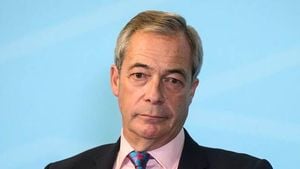The Australian Greens suffered a significant setback in the federal election held on Saturday, May 3, 2025, with the party poised to lose all three Queensland seats it gained during the 2022 election. The results have raised alarms within the party, particularly for leader Adam Bandt, who is now facing a tight race in his own Melbourne seat.
After a campaign that aimed to solidify its presence in the federal landscape, the Greens found themselves in a precarious position. The party's primary vote saw a slight increase from 12 percent in 2022 to 13 percent, but this was not enough to secure victories in critical electorates. As the night unfolded, the party's hopes of expanding its influence appeared to fade.
In Brisbane, the ALP candidate Madonna Jarrett was leading with 50.03 percent of the votes counted, while the LNP's Trevor Evans trailed at 32.7 percent. Greens incumbent Stephen Bates was polling third with just 27.4 percent, marking a devastating blow to the party. In Griffith, Labor's Renee Coffey was ahead with 35.1 percent, compared to Bates's 33.3 percent, indicating a significant swing against the Greens, who had previously held the seat with a 10.4 percent margin.
The seat of Ryan remains too close to call, with only 49.83 percent of votes counted. Liberal candidate Maggie Forrest is slightly ahead of incumbent Elizabeth Watson-Brown, while Labor's Rebecca Hack sits at 28.2 percent. The uncertainty surrounding Ryan adds to the tension, as the Greens are at risk of losing all three seats they had previously secured.
Following the disappointing results, speeches from the three Queensland Greens MPs were canceled. Max Chandler-Mather, Stephen Bates, and Elizabeth Watson-Brown had been scheduled to address supporters at a crowded event in Woolloongabba, but the mood quickly shifted as the reality of the election results set in.
Labor had heavily targeted Queensland, entering the race with only five seats in the state, while the Liberals also contested key electorates, creating a competitive three-way contest that the Greens struggled to navigate. Earlier in 2025, both government and opposition figures accused the Greens of exploiting the Israel-Palestine conflict for political gain, further complicating their campaign.
In Victoria, the Greens faced challenges as well. In the seat of Wills, Greens candidate Samantha Ratnam was attempting to unseat Labor incumbent Peter Khalil. However, with 64.96 percent of votes counted, Khalil was leading by a narrow margin of three percent. Meanwhile, Greens leader Adam Bandt was projected to retain his Melbourne seat, leading with 42.2 percent of the vote, but the outcome remained too close to call.
Chandler-Mather, who had been a prominent figure in the party and a vocal advocate for housing reform, conceded his defeat late on election night. He reached out to Coffey to congratulate her on her victory in Griffith. "What we are trying to do is fundamentally transform Australian politics, economy and society in favour of ordinary working people," he told supporters. "That sort of project is going to have more setbacks than it has victories because the forces that we are coming up against are enormously powerful. I believe we can get there. I believe we can win. It is going to take time."
Despite the setbacks, Bandt remained optimistic about the Greens' future in the Senate, where they are expected to retain six contested seats. "One thing is clear, though: we have kept Dutton out," he stated, referring to the Liberal leader who lost his seat in a nearby electorate. However, Bandt also acknowledged the challenges posed by Liberal preferences flowing to Labor, which significantly impacted the Greens' chances.
The Greens had set ambitious goals for the election, aiming to regain their four existing seats and add five more, including two in Melbourne and one each in regional New South Wales, South Australia, and Western Australia. However, the reality of the election results indicated that they would likely fall short of these aspirations.
In Brisbane, the atmosphere at the Greens' election-night function was initially upbeat, with music and dancing among supporters. Yet, as results began to trickle in, the mood shifted. Early projections indicated that both Chandler-Mather and Bates would lose their seats, leading to a palpable sense of disappointment among party members.
As the night progressed, the true extent of the Greens' failure to boost their primary vote in key electorates became clearer. Issues such as housing, climate change, and the party's stance on the Israel-Palestine conflict failed to resonate with voters as intended. The Greens' efforts to differentiate themselves from Labor by advocating for policies like rent caps and reduced tax benefits for property investors did not translate into electoral gains.
In the broader context, the election results also highlighted the resilience of teal independents, who retained their seats with improved margins and challenged the traditional dominance of the Liberal Party. Allegra Spender and Zali Steggall, both independents, successfully held onto their seats in Wentworth and Warringah, respectively, despite intense competition.
In conclusion, the federal election of May 3, 2025, marked a significant moment for the Australian Greens, as they faced the prospect of losing key seats and grappling with the implications of their electoral strategy. The party's leadership will need to reassess its approach moving forward, especially in light of the shifting political landscape and the challenges posed by preference flows and voter sentiment.





